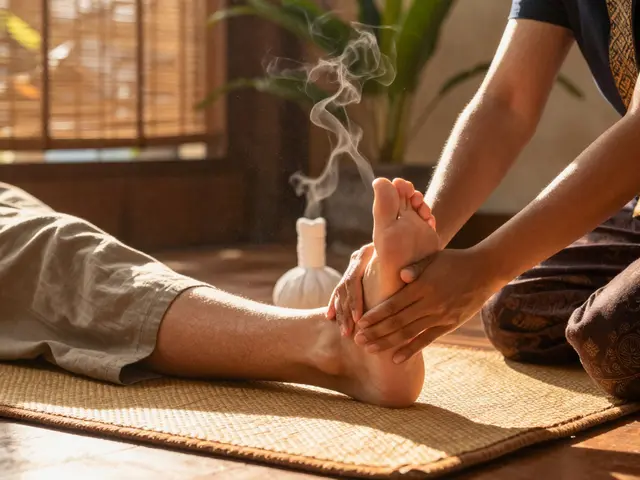The Economics of the Escort Industry in Paris

Paris isn’t just about cafés and cathedrals. Beneath its polished surface, there’s a quiet, thriving economy built on personal connection-and it’s not what most tourists see. The escort industry in Paris operates in the gray zone between legality and social stigma, but it’s undeniably real, profitable, and deeply embedded in the city’s service economy. Thousands of people, mostly women, work as independent escorts here, earning anywhere from €80 to €600 an hour. They don’t work for agencies. They don’t advertise on street corners. They use encrypted apps, private websites, and word-of-mouth networks to connect with clients who value discretion, companionship, and sometimes, just someone to talk to.
How the Paris Escort Market Actually Works
Unlike in cities like Amsterdam or Berlin, where prostitution is regulated or decriminalized, France has a unique legal setup. Since 2016, selling sex isn’t illegal-but buying it is. That means clients can be fined up to €1,500, but escorts aren’t arrested for working. This law, called the ‘Nordic model,’ was meant to protect sex workers by targeting demand. In practice, it pushed the industry further underground. Now, most escorts in Paris work alone, using platforms like OnlyFans, private Telegram channels, or curated websites with coded language like ‘private evening’ or ‘cultural companion.’
There are no brothels. No visible street walkers. No neon signs. The entire system runs on trust, reputation, and digital footprints. Many escorts build profiles on sites like ParisCompanions is a well-known private directory for independent escorts in Paris, used by over 1,200 active workers as of 2025. Others rely on Instagram DMs, where photos are tasteful, locations are vague, and conversations start with questions like, ‘Do you like jazz?’ or ‘Have you been to the Musée d’Orsay lately?’
Who Are the Escorts in Paris?
There’s no single profile. Some are students from Eastern Europe or North Africa studying at Sorbonne or Sciences Po, supplementing their income. Others are artists, writers, or former models who found that companionship pays better than gallery openings. A growing number are French women in their 30s and 40s-divorced, single mothers, or simply tired of corporate life-who value the autonomy. One escort I spoke with, who goes by ‘Camille’ (not her real name), said she works three days a week, earns €15,000 a month, and uses the money to pay for her daughter’s private school. ‘I’m not selling sex,’ she told me. ‘I’m selling time. And silence. And someone who doesn’t judge you for being tired.’
Many don’t even call themselves escorts. They prefer ‘companion,’ ‘hostess,’ or ‘concierge.’ The language is carefully chosen to avoid legal traps and social judgment. Their services vary: dinner dates, museum tours, hotel stays, weekend getaways to Normandy or the Côte d’Azur. Some clients want sex. Many just want to be heard.
Money Flow: How Much Do They Really Make?
Earnings depend on experience, language skills, appearance, and niche. A new escort starting out might charge €80-€120/hour. Someone fluent in English, Mandarin, or Arabic can charge €200-€300. Top-tier escorts-those with polished social media presence, high-end clientele, and repeat clients-can hit €500-€600/hour. A few even work exclusively for international business travelers, charging €3,000-€5,000 per weekend.
They don’t pay taxes. Most don’t have bank accounts linked to this income. Many use cash, cryptocurrency, or prepaid cards. One escort I met uses Monese, a digital bank popular with freelancers, to receive payments from clients abroad. She keeps two separate phones: one for work, one for family. Her expenses? Rent in the 16th arrondissement, a personal trainer, skincare, and a VPN subscription. She spends less on makeup than most Parisian office workers.
The industry’s annual revenue in Paris is estimated at €250-€350 million, based on client surveys and platform data from 2024. That’s more than the city’s annual budget for public art installations. And it’s growing. After the pandemic, demand surged among expats, remote workers, and lonely executives who realized they couldn’t find real connection in Zoom calls.

Why Clients Pay So Much
It’s not just about sex. In Paris, where social hierarchies are rigid and small talk is an art form, the escort industry fills a gap that dating apps and therapy can’t. Clients aren’t just men. About 25% are women-often professionals in their 40s who feel isolated in a city that values appearances over authenticity. Others are foreign diplomats, tech founders, or journalists who travel alone and don’t want to eat dinner in a hotel room every night.
One client, a German engineer working in La Défense, told me he pays €400 every other week for a woman who reads him poetry in French and takes him to quiet bookshops in Saint-Germain. ‘I don’t need sex,’ he said. ‘I need to feel normal. And she makes me feel like I’m not a number on a spreadsheet.’
For many, the escort is the only person in their life who listens without an agenda. That’s the real product: emotional labor. And in a city obsessed with elegance and performance, that’s worth more than a bottle of champagne.
Risks and Realities
It’s not all luxury apartments and Michelin dinners. Escorts face real dangers. Harassment from clients. Blackmail. Stalking. Police raids on apartments-though rare, they happen. One escort was arrested last year after a client’s wife found her Instagram and reported her. The police didn’t charge her for prostitution-they charged the client for soliciting. But the escort lost her apartment, her phone, and her reputation overnight.
There’s no union. No health insurance. No legal recourse if a client steals money or threatens violence. Some join online forums like Paris Safety Network is a private, encrypted group of over 800 escorts in Paris that shares client blacklists, safe meeting tips, and emergency contacts. They exchange codes: ‘red’ means the client is drunk, ‘blue’ means he’s recording, ‘green’ means it’s safe.
Many work with a ‘minder’-a trusted friend who checks in during appointments. Others use apps like SafeTogether, which sends an alert to three contacts if the escort doesn’t check in within an hour. These aren’t luxuries. They’re survival tools.

The Future of the Industry
The industry is evolving. More escorts are moving into content creation-OnlyFans, Patreon, subscription-based video chats. Some have turned their profiles into mini-brands, selling digital guides on ‘how to be a Parisian companion’ or ‘how to dress like a French woman without trying.’ One former escort now runs a YouTube channel teaching women how to negotiate rates and set boundaries. She has 42,000 subscribers.
Politicians still talk about ‘cracking down.’ But enforcement is patchy. The police focus on trafficking, not consensual work. And with inflation pushing rents up and wages stagnant, more people are turning to this work-not out of desperation, but because it’s one of the few jobs that pays well and lets you set your own hours.
There’s no sign this will end. In fact, it’s getting more organized. New platforms are emerging that vet clients, offer legal advice, and even provide mental health support. A nonprofit called Les Étoiles is a Paris-based nonprofit that offers free legal consultations, housing support, and therapy sessions to independent sex workers, serving over 300 women since 2022. They don’t push for legalization. They push for dignity.
What This Says About Paris
The escort industry in Paris isn’t a shadow economy. It’s a mirror. It reflects how lonely the city can be. How expensive it is to live here. How hard it is to be seen without being judged. It shows that people will pay for connection-even if society says it’s wrong.
Paris pretends it doesn’t exist. But everyone knows it’s there. The real question isn’t whether it should be banned. It’s why we let people need this service in the first place.
Is it legal to hire an escort in Paris?
It’s illegal to pay for sex in France under the 2016 law, which criminalizes the client, not the worker. Escorts aren’t arrested for working, but clients can be fined up to €1,500. This makes the industry underground but not nonexistent. Most escorts operate through private networks to avoid legal exposure.
How much do escorts in Paris typically earn?
Earnings vary widely. New escorts charge €80-€120/hour. Experienced workers with language skills or a strong online presence earn €200-€300/hour. Top-tier escorts, especially those catering to international clients, can make €500-€600/hour. Some earn €3,000-€5,000 per weekend for exclusive services. Monthly income for full-time workers ranges from €8,000 to €20,000, depending on availability and clientele.
Are most escorts in Paris foreign workers?
No. While many are from Eastern Europe, North Africa, and Latin America, a significant portion are French women-often in their 30s and 40s-who work part-time to support themselves. Many are students, artists, or former professionals who value the flexibility and income. Language skills, especially fluency in English, Mandarin, or German, are more important than nationality when setting rates.
Do escorts in Paris work for agencies?
Almost never. Due to legal risks, the vast majority work independently. Agencies are rare and usually operate illegally. Most use encrypted apps, private websites, or social media DMs to connect with clients. Platforms like ParisCompanions and OnlyFans are common tools for advertising and booking, but they’re managed by the workers themselves.
What kind of services do escorts in Paris offer?
Services range from dinner dates and museum tours to hotel stays and weekend trips. Many clients seek companionship, conversation, or emotional support rather than sex. Escorts often describe their work as selling time, attention, and discretion. Physical intimacy is common but not guaranteed-it’s negotiated case by case. The most successful escorts build long-term relationships with repeat clients who value their presence more than any specific act.
Is the escort industry growing in Paris?
Yes. Since 2020, demand has increased significantly, driven by remote workers, expats, and lonely professionals. The industry’s estimated annual revenue is now €250-€350 million. More women are entering the field as traditional jobs fail to keep up with rising living costs. Digital tools like OnlyFans and Telegram have made it easier to operate safely and independently, fueling growth despite legal risks.
How do escorts in Paris stay safe?
Safety is a top priority. Most use encrypted messaging apps, never share personal details, and meet in public places first. Many work with a ‘minder’-a friend who checks in during appointments. Apps like SafeTogether send alerts if the escort doesn’t check in within an hour. Online groups like Paris Safety Network share blacklists and real-time warnings. Some also use fake names, separate phones, and prepaid cards to protect their identity.





